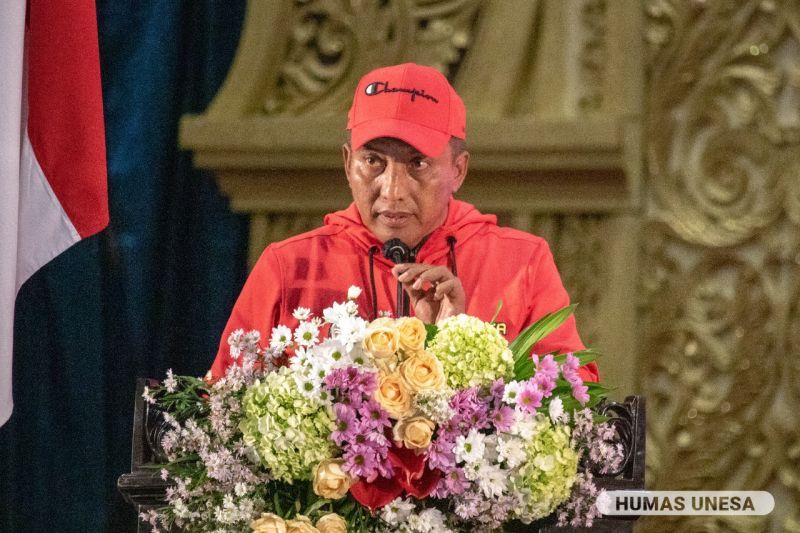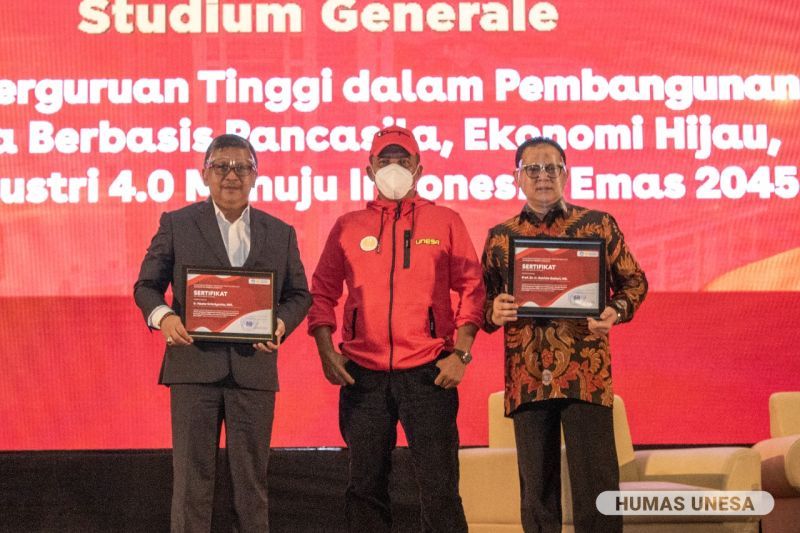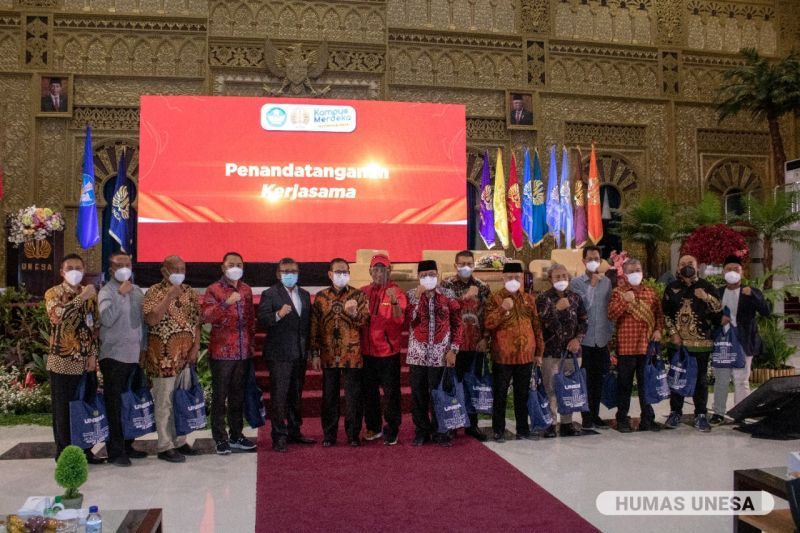
www.unesa.ac.id
Unesa.ac.id, SURABAYA - Universitas Negeri Surabaya (UNESA) held the Stadium Generale by inviting a number of speakers, namely the Minister of Maritime Affairs and Fisheries of Indonesia for the period 2001-2004, Prof. Dr. Ir. Rokhmin Dahuri, MS and Secretary General of the Indonesian Democratic Party of Struggle (PDIP) Ir. Hasto Kristiyanto, M.M., at Graha Unesa on Friday (25/2/22).
The event was coupled with the signing of cooperation with a number of regional, district and city heads in East Java. On that occasion, Hasto Kristiyanto said that universities have an important role in the development of the nation and state in the future.

www.unesa.ac.id
Generations with Pancasila character who are involved in advancing the green economy and industry 4.0 towards a golden Indonesia 2045 must be born from campuses. “Pancasila must be the philosophical basis of a green economy in Indonesia, the basis of character and the basis of the behavior of the nation and state. This should be pursued in the future together with universities,” he said.
He appreciated several UNESA breakthroughs which from the beginning had given more attention to strengthening the Pancasila ideology in the community and encouraging regional heads to bring progress in their respective regions. "Earlier I heard from the Chancellor as well, the Surabaya City Government and UNESA gotong royong in building Surabaya, especially in the education sector," he explained.
He hoped that the commitment of UNESA and regional heads through the MoU could be realized soon, so that the implementation of the tridharma of higher education would go well and regional development would proceed according to the mutual desire. “This cooperation should not only end in the MoU, but must be realized immediately. This is a good mutualism symbiosis between the campus and the local government. I hope this is a strategic collaboration towards a developed region and a growing and superior Indonesia," he concluded.
Meanwhile, Prof. Rokhmin Dahuri supports the UNESA movement as a campus that is committed to strengthening the Pancasila ideology through various programs that directly touch rural and urban communities. According to him, the facts show that a developed and prosperous country is one that has strong cooperation between the central-regional government, campuses and industry.
"Hopefully this cooperation will be a manifestation of establishing independence, being independent to produce technology in various sectors. I hope that young people, including UNESA students, can continue to produce 4.0 applications and innovative works that have an impact on the progress of society," hoped the Professor of IPB. “I hope that in the future UNESA alumni will produce graduates who are involved in entrepreneurship both in the education and non-education sectors. Hopefully this can be a reference for students and lecturers so that it becomes a world-class campus," he hoped again.

www.unesa.ac.id
HR and Pancasila Village
In order to improve human resources and explore the regional potential of the education sector and strengthen the Pancasila ideology in the regions, on that occasion, UNESA signed a memorandum of understanding or MoU in cooperation with a number of regents and mayors in East Java.
UNESA Chancellor Prof. Dr. Nurhasan, M.Kes., said that in developing the region, higher education plays an important role. Research and innovation on campuses must be the locomotive of progress and provide benefits to the regions, districts and cities.
"This collaboration is a synergy between campuses and universities in developing education and improving human resources towards advanced regions, regencies and cities for Indonesia to grow and progress," he said.
Cooperation in the future is one-sided, namely as the implementation of MBKM encouraging students and lecturers to be involved in regional development. In the future, Cak Hasan hopes that UNESA lecturers and students will be involved in building educational villages in the regions, districts to villages and sub-districts.
There are several plans for the cooperation, namely to build and develop Pancasila villages in the regions. According to him, the Pancasila village will later become important centers of ideological development and as a place for the earthing of Pancasila directly in the midst of society.
"Our program is certainly not just a discussion or doctrine, but actually brings Pancasila into the realm of innovation, achievement, and collaboration in the community. We have pioneered Pancasila villages in several districts, later through this collaboration we will multiply them again," he said.
In addition, it is also to build and develop an educational village and a sports village. "Anyway, UNESA, through its various superior programs, must be able to cooperate with the regions to produce progress and excellence," he explained.
Mayor of Surabaya, Eri Cahyadi, appreciated UNESA's move. He explained that the Surabaya City Government itself has long collaborated with UNESA, especially in developing the Suroboyo arek education village in Surabaya. "Even recently, the Surabaya City Government launched the MBKM program with campuses, such as UNESA," he explained. "We hope that this collaboration will certainly be for the progress of the city of Surabaya and the happiness of its citizens," he said after the event.
The public lecture was attended by a number of regional officials including; the regents of Malang, Gresik, Trenggalek, the mayor of Blitar, the mayor of Surabaya, the chairman of the Surabaya City DPRD and all levels of leadership and the UNESA academic community. [UNESA PR]
Author: Riska, Hasna
Editor : @Zam
Share It On:






